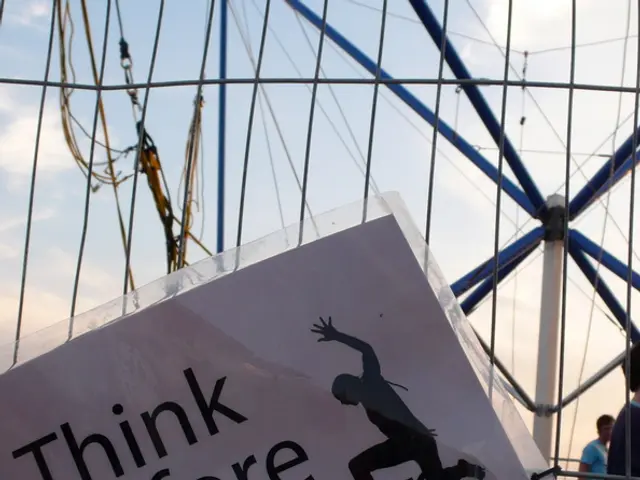Impact of George Floyd's Death on Law Enforcement and Criminal Justice: Insights from Three Key Figures
Updated May 25, 2025 at 4:01 AM CDT
George Floyd's death in the summer of 2020 spurred widespread protests and calls for change within the U.S. criminal justice system. The incidents that followed highlighted long-standing issues with racial bias in policing, local government, and the broader legal system.
Floyd was killed after a white police officer knelt on his neck for over nine minutes. The powerful images captured on cellphone video sparked outrage and protests across the country and around the world. Lawmakers at the federal and state levels pushed for legislative changes to address police reform.
In response, about 20 states restricted or clarified the types of force that police officers could use and how. Some states outlawed chokeholds, limited the use of force on those attempting to flee the scene, and required officers to report using force to state or federal authorities, according to the Brennan Center for Justice.
However, no significant federal police reform laws were enacted. In 2021, after a jury convicted former Minneapolis police officer Derek Chauvin in Floyd's murder, then-Attorney General Merrick Garland initiated a federal civil rights investigation into the Minneapolis Police Department. The probe found that officers routinely used excessive force against Black civilians and discriminated against people with mental health issues.
On the brink of leaving the White House in January 2025, the city of Minneapolis and the Department of Justice signed a proposed consent decree, intending to enact substantial changes in the city's police department. The decree banned chokeholds and neck restraints and mandated officers to report colleagues violating people's rights.
However, days before the fifth anniversary of Floyd's death, President Trump's Department of Justice filed a motion to dismiss the Minneapolis consent decree, seeking to withdraw from the proposed agreement. A similar lawsuit in Louisville, Ky., that had been opened after the police shooting of Breonna Taylor also faced opposition from the administration.
Despite some progress made to address racial bias in policing, critics argue that there has also been regression and resistance to change. In an effort to better understand this dynamic, NPR's Michel Martin spoke to Minnesota Attorney General Keith Ellison, Minneapolis Mayor Jacob Frey, and civil rights attorney Benjamin Crump.
Ellison, who prosecuted the case against Chauvin, and Frey, who has been mayor since 2017, offered insights on pushing for police reform and navigating pushback against those changes. Crump, who represented Floyd's family and the relatives of other victims of police violence, discussed the ongoing struggles for justice.
Here's what they had to say about efforts to reform policing and the justice system:
Frey on the progress in Minneapolis
Martin: What has changed in the five years since George Floyd was killed by a Minneapolis police officer?
Frey: Floyd's death was a reckoning around racial justice that was 100 years in the making. In Minneapolis, we feel the impact acutely. As the city where Floyd was murdered, we are committed to ensuring justice and setting an example for other cities.
Martin: The Department of Justice announced it wants to withdraw from the consent decree. Does that send a mixed message, and if so, how do you reinforce the message you want to send?
Frey: We will comply with every sentence in the 169-page agreement, regardless of the White House's stance. People have demanded change for years, and we will not back away from the agreement simply because Trump is.
Ellison on progress in Minneapolis
Martin: What do you think about the timing of the Trump administration's announcement to back out of the proposed consent decree?
Ellison: The timing indicates contempt for Floyd, his family, and everyone who protested for justice. It's a disgrace that demonstrates hostility towards meaningful police reform.
Martin: The independent monitor overseeing the city's progress in meeting the goals set in the state agreement reported that Minneapolis is making progress in several areas. What's your reaction to this, and what do you say to people who argue it takes too long to make meaningful change?
Ellison: The progress that we've made is because many people have committed to meaningful reform. If we continue to move in the right direction, we can change the system for the better.
Crump on the struggle for justice
Martin: What do you think sparked the worldwide movement following Floyd's death?
Crump: People felt a connection to Floyd's death because they saw him as a loved one—a son, a brother, or a neighbor. His killing was a clarion call for justice after so many tragedies, including the deaths of Martin, Brown, Rice, Castile, and Bland.
Martin: Since you first became a national figure after Trayvon Martin's death in 2012, you've handled numerous cases. Despite your success in bringing peace to families, you continue to receive new cases. How do you feel about that, and how do you think about it?
Crump: Monetary damages in civil court provide a measure of justice for families. But lasting change requires election of prosecutors and legislators who will prioritize fair and equal enforcement of the law.
As we remember Floyd five years after his death, we must continue to fight for systemic change, improve police accountability, and advocate for racial justice.
- The government's attempt to withdraw from the Minneapolis consent decree, as announced by the Trump administration, is perceived as a disgrace and a display of contempt towards meaningful police reform by Minnesota Attorney General Keith Ellison.
- The city of Minneapolis, despite facing resistance from the White House, remains committed to ensuring justice and making progress in police reform, as reflected in Mayor Jacob Frey's determination to implement every sentence in the 169-page agreement regarding the city's police department.
- Civil rights attorney Benjamin Crump stresses the importance of electing prosecutors and legislators who prioritize fair and equal enforcement of the law, as the ongoing struggle for justice and systemic change transcends individual cases in the realm of crime and justice.








